Health Sociology: Exploring Conflict and Functionalist Perspectives
VerifiedAdded on 2023/06/10
|7
|2010
|284
Essay
AI Summary
This essay delves into the realm of health sociology, examining two prominent theoretical frameworks: conflict theory and functionalist theory. The essay begins by introducing the core concepts of sociology and its relevance to health, emphasizing the impact of social factors on health outcomes. It then provides a detailed explanation of conflict theory, highlighting how social inequalities and disparities in resource distribution, particularly income and wealth, influence access to healthcare and health outcomes. The essay contrasts this with functionalist theory, which views health as essential for the stability and smooth functioning of society, and explores the concept of the "sick role". The analysis extends to the biomedical and social models of health, contrasting their approaches to understanding and addressing illness. The biomedical model, with its focus on biological factors, is contrasted with the social model, which emphasizes the role of socioeconomic, environmental, and cultural factors. The essay concludes by summarizing the key differences between the conflict and functionalist theories and their implications for understanding health and illness in society.

HEALTH SOCIOLOGY 0
HEALTH SOCIOLOGY
SOCIOLOGY
7/19/2018
HEALTH SOCIOLOGY
SOCIOLOGY
7/19/2018
Paraphrase This Document
Need a fresh take? Get an instant paraphrase of this document with our AI Paraphraser
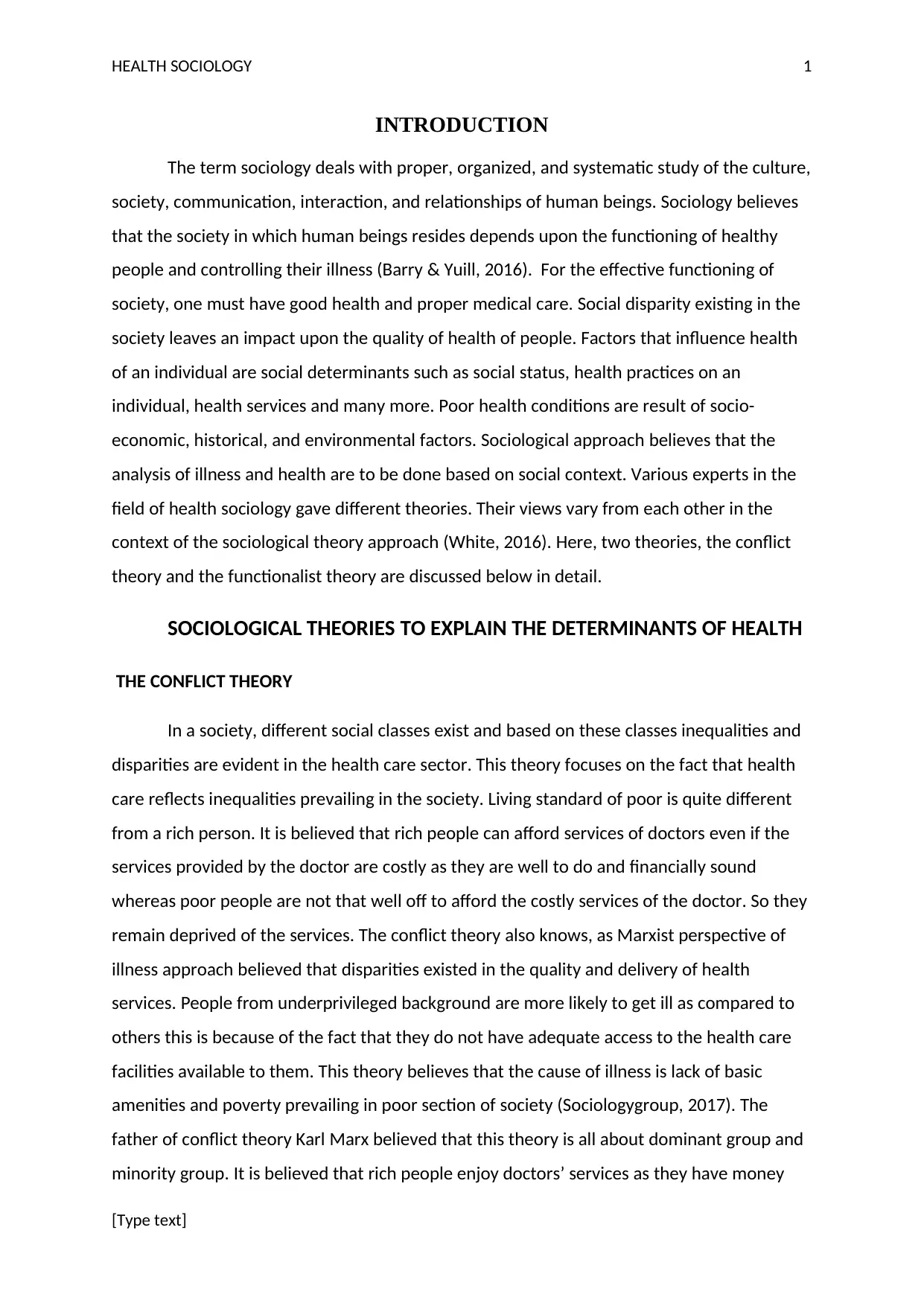
HEALTH SOCIOLOGY 1
INTRODUCTION
The term sociology deals with proper, organized, and systematic study of the culture,
society, communication, interaction, and relationships of human beings. Sociology believes
that the society in which human beings resides depends upon the functioning of healthy
people and controlling their illness (Barry & Yuill, 2016). For the effective functioning of
society, one must have good health and proper medical care. Social disparity existing in the
society leaves an impact upon the quality of health of people. Factors that influence health
of an individual are social determinants such as social status, health practices on an
individual, health services and many more. Poor health conditions are result of socio-
economic, historical, and environmental factors. Sociological approach believes that the
analysis of illness and health are to be done based on social context. Various experts in the
field of health sociology gave different theories. Their views vary from each other in the
context of the sociological theory approach (White, 2016). Here, two theories, the conflict
theory and the functionalist theory are discussed below in detail.
SOCIOLOGICAL THEORIES TO EXPLAIN THE DETERMINANTS OF HEALTH
THE CONFLICT THEORY
In a society, different social classes exist and based on these classes inequalities and
disparities are evident in the health care sector. This theory focuses on the fact that health
care reflects inequalities prevailing in the society. Living standard of poor is quite different
from a rich person. It is believed that rich people can afford services of doctors even if the
services provided by the doctor are costly as they are well to do and financially sound
whereas poor people are not that well off to afford the costly services of the doctor. So they
remain deprived of the services. The conflict theory also knows, as Marxist perspective of
illness approach believed that disparities existed in the quality and delivery of health
services. People from underprivileged background are more likely to get ill as compared to
others this is because of the fact that they do not have adequate access to the health care
facilities available to them. This theory believes that the cause of illness is lack of basic
amenities and poverty prevailing in poor section of society (Sociologygroup, 2017). The
father of conflict theory Karl Marx believed that this theory is all about dominant group and
minority group. It is believed that rich people enjoy doctors’ services as they have money
[Type text]
INTRODUCTION
The term sociology deals with proper, organized, and systematic study of the culture,
society, communication, interaction, and relationships of human beings. Sociology believes
that the society in which human beings resides depends upon the functioning of healthy
people and controlling their illness (Barry & Yuill, 2016). For the effective functioning of
society, one must have good health and proper medical care. Social disparity existing in the
society leaves an impact upon the quality of health of people. Factors that influence health
of an individual are social determinants such as social status, health practices on an
individual, health services and many more. Poor health conditions are result of socio-
economic, historical, and environmental factors. Sociological approach believes that the
analysis of illness and health are to be done based on social context. Various experts in the
field of health sociology gave different theories. Their views vary from each other in the
context of the sociological theory approach (White, 2016). Here, two theories, the conflict
theory and the functionalist theory are discussed below in detail.
SOCIOLOGICAL THEORIES TO EXPLAIN THE DETERMINANTS OF HEALTH
THE CONFLICT THEORY
In a society, different social classes exist and based on these classes inequalities and
disparities are evident in the health care sector. This theory focuses on the fact that health
care reflects inequalities prevailing in the society. Living standard of poor is quite different
from a rich person. It is believed that rich people can afford services of doctors even if the
services provided by the doctor are costly as they are well to do and financially sound
whereas poor people are not that well off to afford the costly services of the doctor. So they
remain deprived of the services. The conflict theory also knows, as Marxist perspective of
illness approach believed that disparities existed in the quality and delivery of health
services. People from underprivileged background are more likely to get ill as compared to
others this is because of the fact that they do not have adequate access to the health care
facilities available to them. This theory believes that the cause of illness is lack of basic
amenities and poverty prevailing in poor section of society (Sociologygroup, 2017). The
father of conflict theory Karl Marx believed that this theory is all about dominant group and
minority group. It is believed that rich people enjoy doctors’ services as they have money
[Type text]
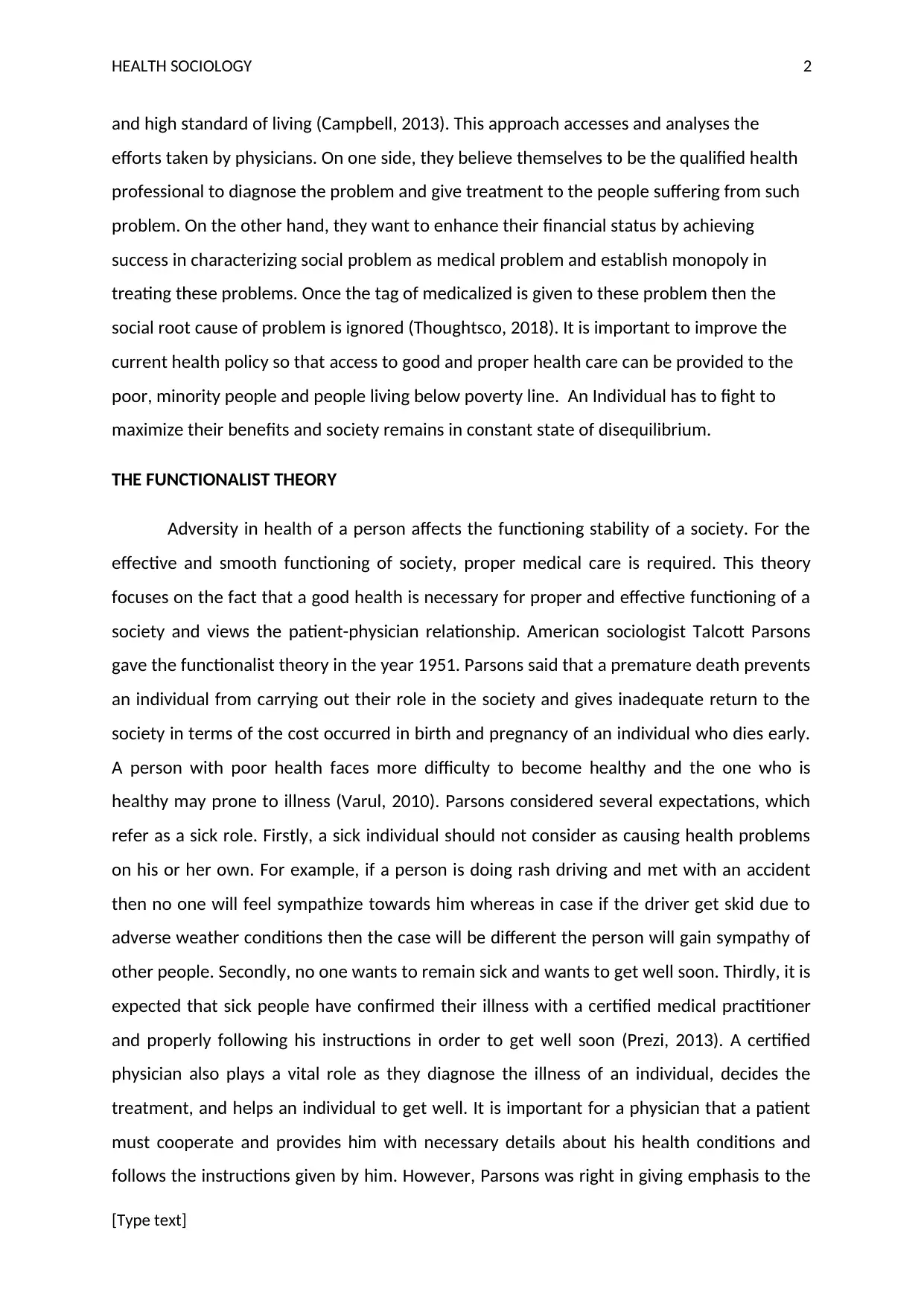
HEALTH SOCIOLOGY 2
and high standard of living (Campbell, 2013). This approach accesses and analyses the
efforts taken by physicians. On one side, they believe themselves to be the qualified health
professional to diagnose the problem and give treatment to the people suffering from such
problem. On the other hand, they want to enhance their financial status by achieving
success in characterizing social problem as medical problem and establish monopoly in
treating these problems. Once the tag of medicalized is given to these problem then the
social root cause of problem is ignored (Thoughtsco, 2018). It is important to improve the
current health policy so that access to good and proper health care can be provided to the
poor, minority people and people living below poverty line. An Individual has to fight to
maximize their benefits and society remains in constant state of disequilibrium.
THE FUNCTIONALIST THEORY
Adversity in health of a person affects the functioning stability of a society. For the
effective and smooth functioning of society, proper medical care is required. This theory
focuses on the fact that a good health is necessary for proper and effective functioning of a
society and views the patient-physician relationship. American sociologist Talcott Parsons
gave the functionalist theory in the year 1951. Parsons said that a premature death prevents
an individual from carrying out their role in the society and gives inadequate return to the
society in terms of the cost occurred in birth and pregnancy of an individual who dies early.
A person with poor health faces more difficulty to become healthy and the one who is
healthy may prone to illness (Varul, 2010). Parsons considered several expectations, which
refer as a sick role. Firstly, a sick individual should not consider as causing health problems
on his or her own. For example, if a person is doing rash driving and met with an accident
then no one will feel sympathize towards him whereas in case if the driver get skid due to
adverse weather conditions then the case will be different the person will gain sympathy of
other people. Secondly, no one wants to remain sick and wants to get well soon. Thirdly, it is
expected that sick people have confirmed their illness with a certified medical practitioner
and properly following his instructions in order to get well soon (Prezi, 2013). A certified
physician also plays a vital role as they diagnose the illness of an individual, decides the
treatment, and helps an individual to get well. It is important for a physician that a patient
must cooperate and provides him with necessary details about his health conditions and
follows the instructions given by him. However, Parsons was right in giving emphasis to the
[Type text]
and high standard of living (Campbell, 2013). This approach accesses and analyses the
efforts taken by physicians. On one side, they believe themselves to be the qualified health
professional to diagnose the problem and give treatment to the people suffering from such
problem. On the other hand, they want to enhance their financial status by achieving
success in characterizing social problem as medical problem and establish monopoly in
treating these problems. Once the tag of medicalized is given to these problem then the
social root cause of problem is ignored (Thoughtsco, 2018). It is important to improve the
current health policy so that access to good and proper health care can be provided to the
poor, minority people and people living below poverty line. An Individual has to fight to
maximize their benefits and society remains in constant state of disequilibrium.
THE FUNCTIONALIST THEORY
Adversity in health of a person affects the functioning stability of a society. For the
effective and smooth functioning of society, proper medical care is required. This theory
focuses on the fact that a good health is necessary for proper and effective functioning of a
society and views the patient-physician relationship. American sociologist Talcott Parsons
gave the functionalist theory in the year 1951. Parsons said that a premature death prevents
an individual from carrying out their role in the society and gives inadequate return to the
society in terms of the cost occurred in birth and pregnancy of an individual who dies early.
A person with poor health faces more difficulty to become healthy and the one who is
healthy may prone to illness (Varul, 2010). Parsons considered several expectations, which
refer as a sick role. Firstly, a sick individual should not consider as causing health problems
on his or her own. For example, if a person is doing rash driving and met with an accident
then no one will feel sympathize towards him whereas in case if the driver get skid due to
adverse weather conditions then the case will be different the person will gain sympathy of
other people. Secondly, no one wants to remain sick and wants to get well soon. Thirdly, it is
expected that sick people have confirmed their illness with a certified medical practitioner
and properly following his instructions in order to get well soon (Prezi, 2013). A certified
physician also plays a vital role as they diagnose the illness of an individual, decides the
treatment, and helps an individual to get well. It is important for a physician that a patient
must cooperate and provides him with necessary details about his health conditions and
follows the instructions given by him. However, Parsons was right in giving emphasis to the
[Type text]
⊘ This is a preview!⊘
Do you want full access?
Subscribe today to unlock all pages.

Trusted by 1+ million students worldwide
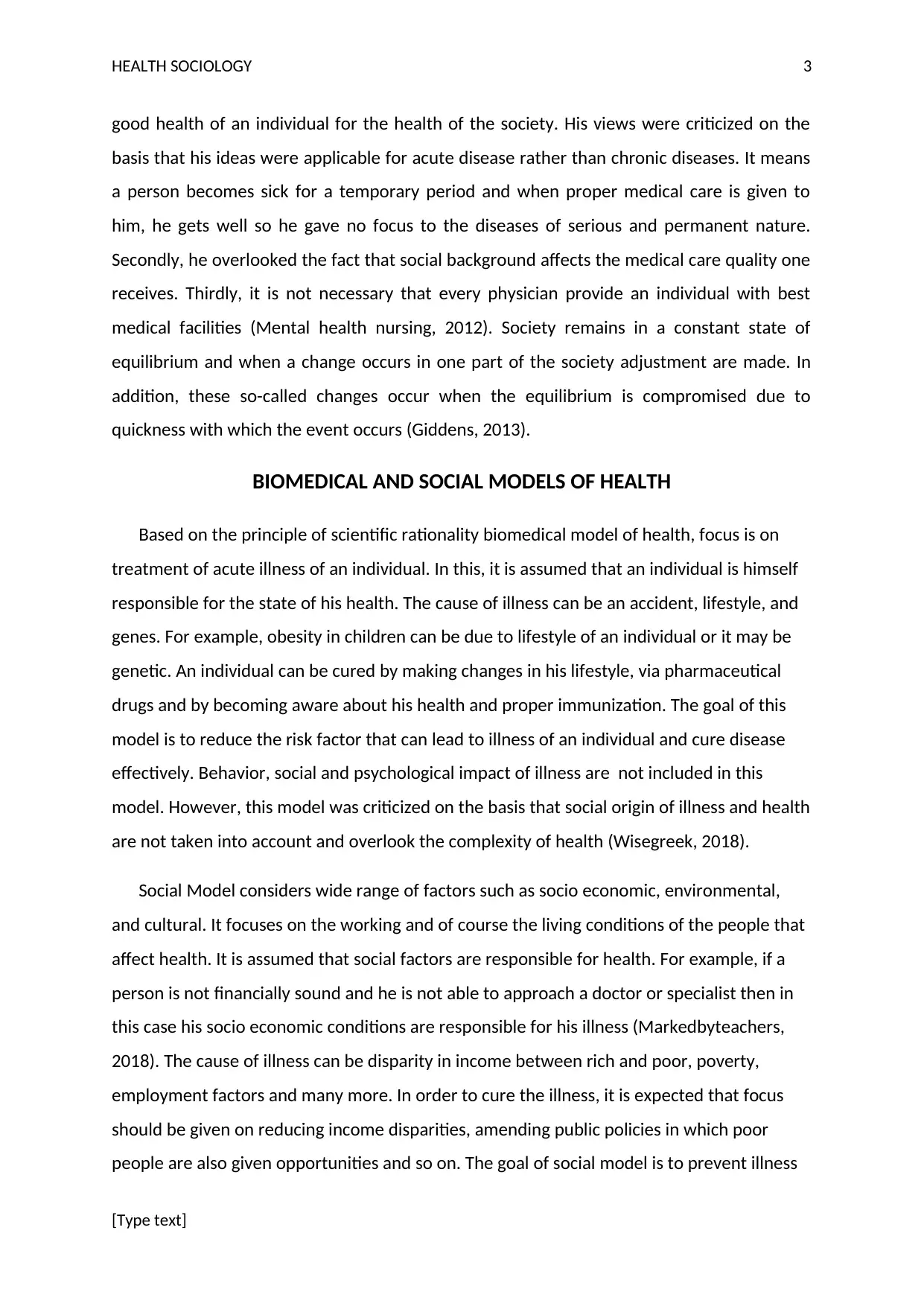
HEALTH SOCIOLOGY 3
good health of an individual for the health of the society. His views were criticized on the
basis that his ideas were applicable for acute disease rather than chronic diseases. It means
a person becomes sick for a temporary period and when proper medical care is given to
him, he gets well so he gave no focus to the diseases of serious and permanent nature.
Secondly, he overlooked the fact that social background affects the medical care quality one
receives. Thirdly, it is not necessary that every physician provide an individual with best
medical facilities (Mental health nursing, 2012). Society remains in a constant state of
equilibrium and when a change occurs in one part of the society adjustment are made. In
addition, these so-called changes occur when the equilibrium is compromised due to
quickness with which the event occurs (Giddens, 2013).
BIOMEDICAL AND SOCIAL MODELS OF HEALTH
Based on the principle of scientific rationality biomedical model of health, focus is on
treatment of acute illness of an individual. In this, it is assumed that an individual is himself
responsible for the state of his health. The cause of illness can be an accident, lifestyle, and
genes. For example, obesity in children can be due to lifestyle of an individual or it may be
genetic. An individual can be cured by making changes in his lifestyle, via pharmaceutical
drugs and by becoming aware about his health and proper immunization. The goal of this
model is to reduce the risk factor that can lead to illness of an individual and cure disease
effectively. Behavior, social and psychological impact of illness are not included in this
model. However, this model was criticized on the basis that social origin of illness and health
are not taken into account and overlook the complexity of health (Wisegreek, 2018).
Social Model considers wide range of factors such as socio economic, environmental,
and cultural. It focuses on the working and of course the living conditions of the people that
affect health. It is assumed that social factors are responsible for health. For example, if a
person is not financially sound and he is not able to approach a doctor or specialist then in
this case his socio economic conditions are responsible for his illness (Markedbyteachers,
2018). The cause of illness can be disparity in income between rich and poor, poverty,
employment factors and many more. In order to cure the illness, it is expected that focus
should be given on reducing income disparities, amending public policies in which poor
people are also given opportunities and so on. The goal of social model is to prevent illness
[Type text]
good health of an individual for the health of the society. His views were criticized on the
basis that his ideas were applicable for acute disease rather than chronic diseases. It means
a person becomes sick for a temporary period and when proper medical care is given to
him, he gets well so he gave no focus to the diseases of serious and permanent nature.
Secondly, he overlooked the fact that social background affects the medical care quality one
receives. Thirdly, it is not necessary that every physician provide an individual with best
medical facilities (Mental health nursing, 2012). Society remains in a constant state of
equilibrium and when a change occurs in one part of the society adjustment are made. In
addition, these so-called changes occur when the equilibrium is compromised due to
quickness with which the event occurs (Giddens, 2013).
BIOMEDICAL AND SOCIAL MODELS OF HEALTH
Based on the principle of scientific rationality biomedical model of health, focus is on
treatment of acute illness of an individual. In this, it is assumed that an individual is himself
responsible for the state of his health. The cause of illness can be an accident, lifestyle, and
genes. For example, obesity in children can be due to lifestyle of an individual or it may be
genetic. An individual can be cured by making changes in his lifestyle, via pharmaceutical
drugs and by becoming aware about his health and proper immunization. The goal of this
model is to reduce the risk factor that can lead to illness of an individual and cure disease
effectively. Behavior, social and psychological impact of illness are not included in this
model. However, this model was criticized on the basis that social origin of illness and health
are not taken into account and overlook the complexity of health (Wisegreek, 2018).
Social Model considers wide range of factors such as socio economic, environmental,
and cultural. It focuses on the working and of course the living conditions of the people that
affect health. It is assumed that social factors are responsible for health. For example, if a
person is not financially sound and he is not able to approach a doctor or specialist then in
this case his socio economic conditions are responsible for his illness (Markedbyteachers,
2018). The cause of illness can be disparity in income between rich and poor, poverty,
employment factors and many more. In order to cure the illness, it is expected that focus
should be given on reducing income disparities, amending public policies in which poor
people are also given opportunities and so on. The goal of social model is to prevent illness
[Type text]
Paraphrase This Document
Need a fresh take? Get an instant paraphrase of this document with our AI Paraphraser
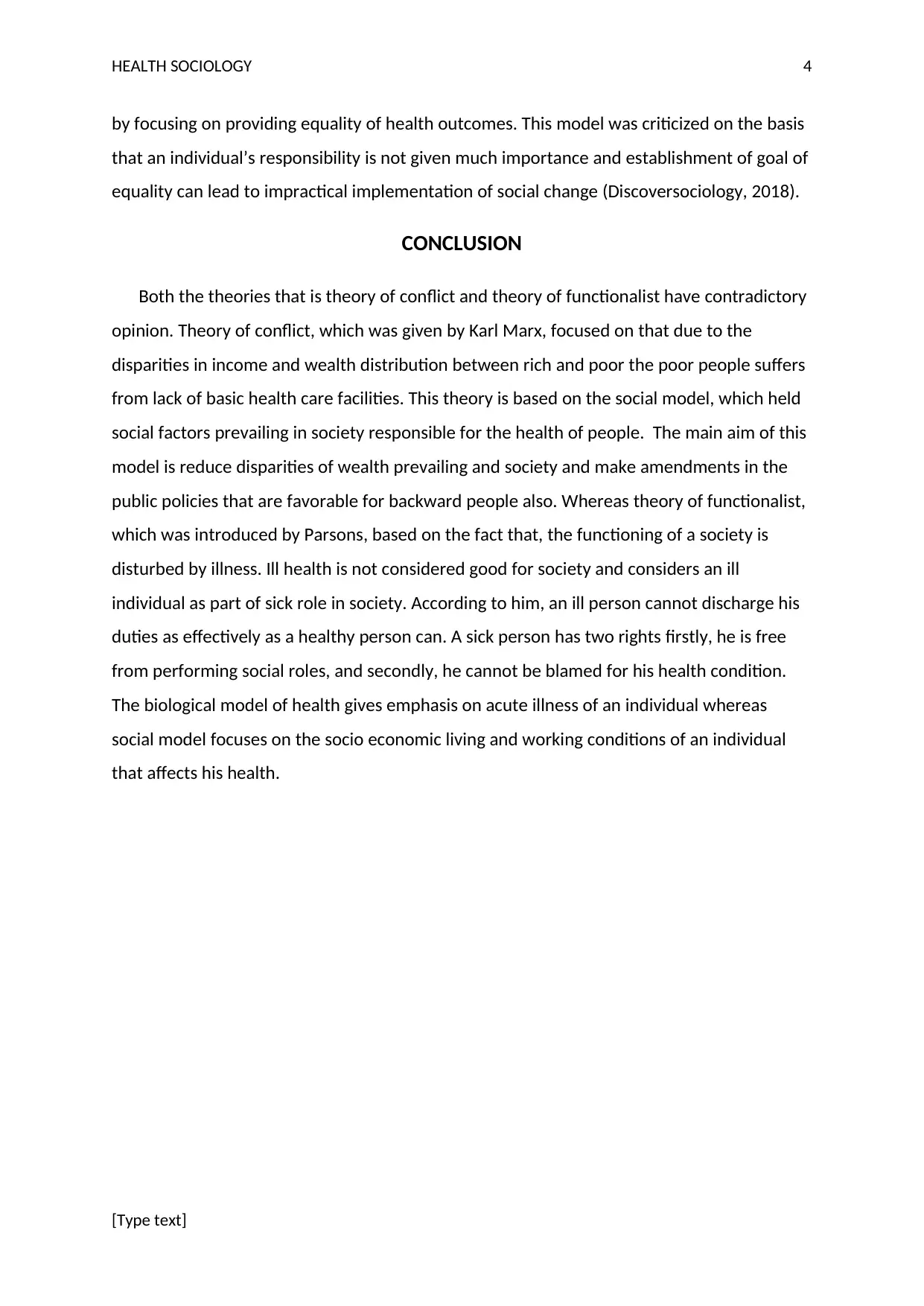
HEALTH SOCIOLOGY 4
by focusing on providing equality of health outcomes. This model was criticized on the basis
that an individual’s responsibility is not given much importance and establishment of goal of
equality can lead to impractical implementation of social change (Discoversociology, 2018).
CONCLUSION
Both the theories that is theory of conflict and theory of functionalist have contradictory
opinion. Theory of conflict, which was given by Karl Marx, focused on that due to the
disparities in income and wealth distribution between rich and poor the poor people suffers
from lack of basic health care facilities. This theory is based on the social model, which held
social factors prevailing in society responsible for the health of people. The main aim of this
model is reduce disparities of wealth prevailing and society and make amendments in the
public policies that are favorable for backward people also. Whereas theory of functionalist,
which was introduced by Parsons, based on the fact that, the functioning of a society is
disturbed by illness. Ill health is not considered good for society and considers an ill
individual as part of sick role in society. According to him, an ill person cannot discharge his
duties as effectively as a healthy person can. A sick person has two rights firstly, he is free
from performing social roles, and secondly, he cannot be blamed for his health condition.
The biological model of health gives emphasis on acute illness of an individual whereas
social model focuses on the socio economic living and working conditions of an individual
that affects his health.
[Type text]
by focusing on providing equality of health outcomes. This model was criticized on the basis
that an individual’s responsibility is not given much importance and establishment of goal of
equality can lead to impractical implementation of social change (Discoversociology, 2018).
CONCLUSION
Both the theories that is theory of conflict and theory of functionalist have contradictory
opinion. Theory of conflict, which was given by Karl Marx, focused on that due to the
disparities in income and wealth distribution between rich and poor the poor people suffers
from lack of basic health care facilities. This theory is based on the social model, which held
social factors prevailing in society responsible for the health of people. The main aim of this
model is reduce disparities of wealth prevailing and society and make amendments in the
public policies that are favorable for backward people also. Whereas theory of functionalist,
which was introduced by Parsons, based on the fact that, the functioning of a society is
disturbed by illness. Ill health is not considered good for society and considers an ill
individual as part of sick role in society. According to him, an ill person cannot discharge his
duties as effectively as a healthy person can. A sick person has two rights firstly, he is free
from performing social roles, and secondly, he cannot be blamed for his health condition.
The biological model of health gives emphasis on acute illness of an individual whereas
social model focuses on the socio economic living and working conditions of an individual
that affects his health.
[Type text]
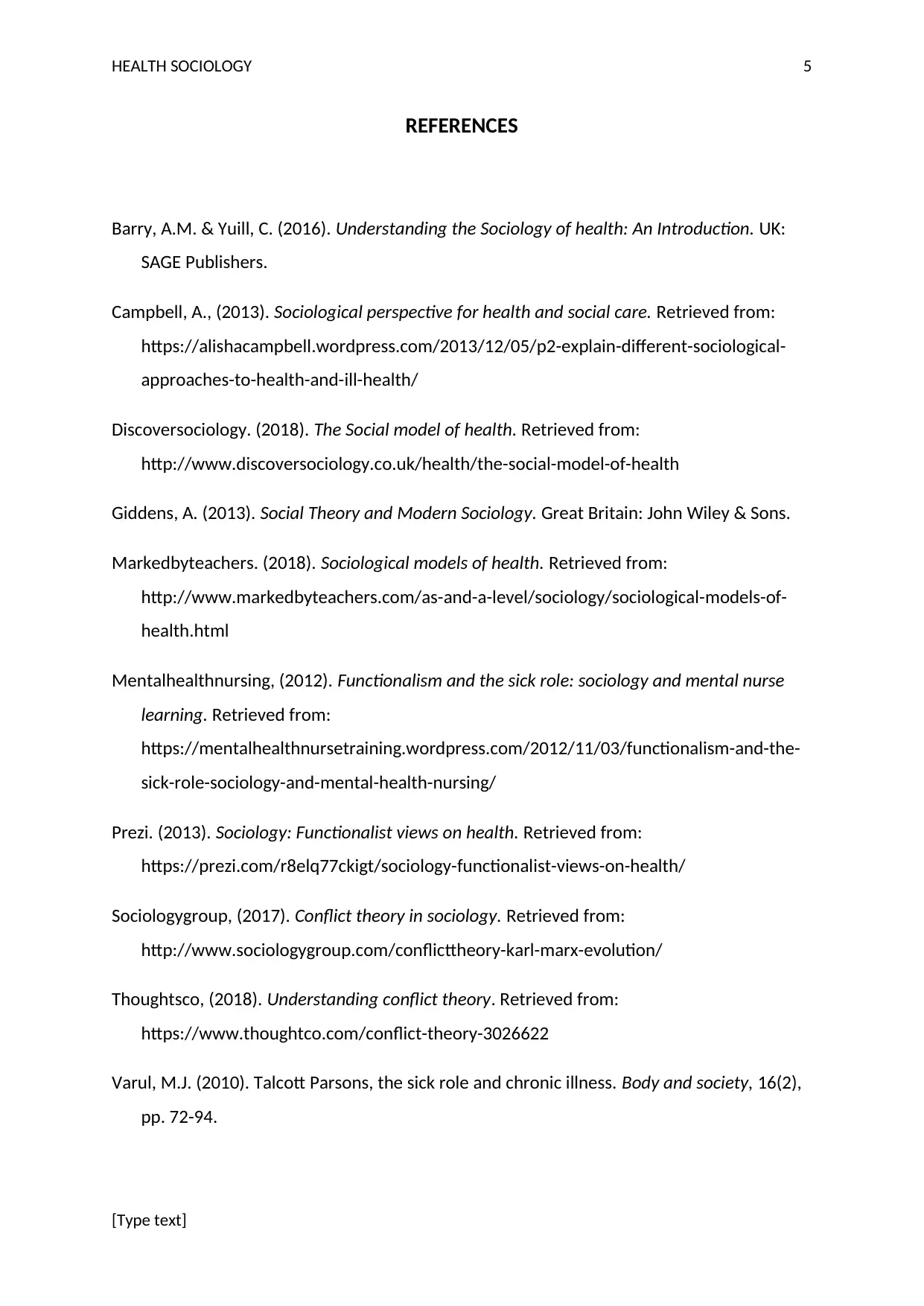
HEALTH SOCIOLOGY 5
REFERENCES
Barry, A.M. & Yuill, C. (2016). Understanding the Sociology of health: An Introduction. UK:
SAGE Publishers.
Campbell, A., (2013). Sociological perspective for health and social care. Retrieved from:
https://alishacampbell.wordpress.com/2013/12/05/p2-explain-different-sociological-
approaches-to-health-and-ill-health/
Discoversociology. (2018). The Social model of health. Retrieved from:
http://www.discoversociology.co.uk/health/the-social-model-of-health
Giddens, A. (2013). Social Theory and Modern Sociology. Great Britain: John Wiley & Sons.
Markedbyteachers. (2018). Sociological models of health. Retrieved from:
http://www.markedbyteachers.com/as-and-a-level/sociology/sociological-models-of-
health.html
Mentalhealthnursing, (2012). Functionalism and the sick role: sociology and mental nurse
learning. Retrieved from:
https://mentalhealthnursetraining.wordpress.com/2012/11/03/functionalism-and-the-
sick-role-sociology-and-mental-health-nursing/
Prezi. (2013). Sociology: Functionalist views on health. Retrieved from:
https://prezi.com/r8elq77ckigt/sociology-functionalist-views-on-health/
Sociologygroup, (2017). Conflict theory in sociology. Retrieved from:
http://www.sociologygroup.com/conflicttheory-karl-marx-evolution/
Thoughtsco, (2018). Understanding conflict theory. Retrieved from:
https://www.thoughtco.com/conflict-theory-3026622
Varul, M.J. (2010). Talcott Parsons, the sick role and chronic illness. Body and society, 16(2),
pp. 72-94.
[Type text]
REFERENCES
Barry, A.M. & Yuill, C. (2016). Understanding the Sociology of health: An Introduction. UK:
SAGE Publishers.
Campbell, A., (2013). Sociological perspective for health and social care. Retrieved from:
https://alishacampbell.wordpress.com/2013/12/05/p2-explain-different-sociological-
approaches-to-health-and-ill-health/
Discoversociology. (2018). The Social model of health. Retrieved from:
http://www.discoversociology.co.uk/health/the-social-model-of-health
Giddens, A. (2013). Social Theory and Modern Sociology. Great Britain: John Wiley & Sons.
Markedbyteachers. (2018). Sociological models of health. Retrieved from:
http://www.markedbyteachers.com/as-and-a-level/sociology/sociological-models-of-
health.html
Mentalhealthnursing, (2012). Functionalism and the sick role: sociology and mental nurse
learning. Retrieved from:
https://mentalhealthnursetraining.wordpress.com/2012/11/03/functionalism-and-the-
sick-role-sociology-and-mental-health-nursing/
Prezi. (2013). Sociology: Functionalist views on health. Retrieved from:
https://prezi.com/r8elq77ckigt/sociology-functionalist-views-on-health/
Sociologygroup, (2017). Conflict theory in sociology. Retrieved from:
http://www.sociologygroup.com/conflicttheory-karl-marx-evolution/
Thoughtsco, (2018). Understanding conflict theory. Retrieved from:
https://www.thoughtco.com/conflict-theory-3026622
Varul, M.J. (2010). Talcott Parsons, the sick role and chronic illness. Body and society, 16(2),
pp. 72-94.
[Type text]
⊘ This is a preview!⊘
Do you want full access?
Subscribe today to unlock all pages.

Trusted by 1+ million students worldwide
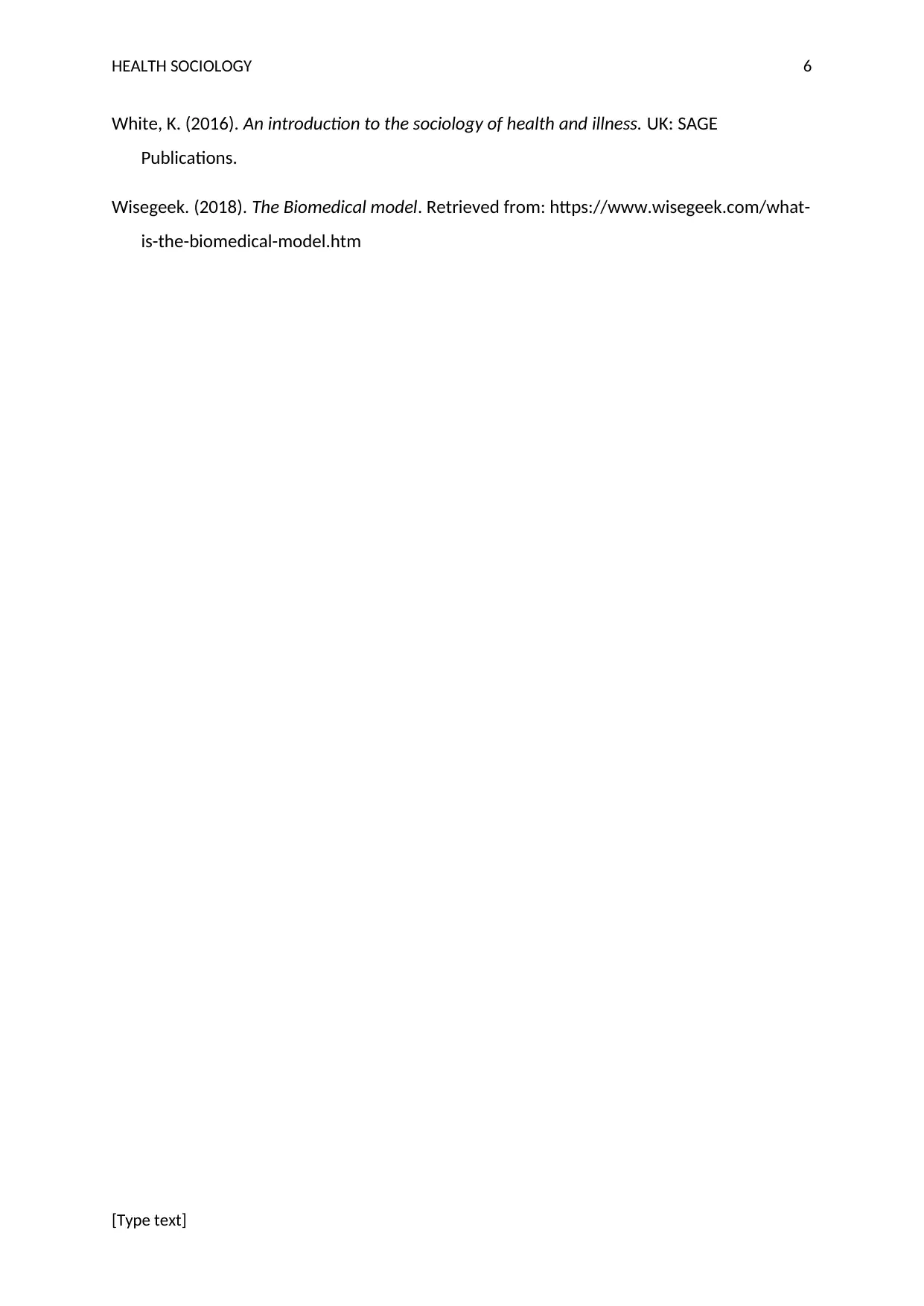
HEALTH SOCIOLOGY 6
White, K. (2016). An introduction to the sociology of health and illness. UK: SAGE
Publications.
Wisegeek. (2018). The Biomedical model. Retrieved from: https://www.wisegeek.com/what-
is-the-biomedical-model.htm
[Type text]
White, K. (2016). An introduction to the sociology of health and illness. UK: SAGE
Publications.
Wisegeek. (2018). The Biomedical model. Retrieved from: https://www.wisegeek.com/what-
is-the-biomedical-model.htm
[Type text]
1 out of 7
Related Documents
Your All-in-One AI-Powered Toolkit for Academic Success.
+13062052269
info@desklib.com
Available 24*7 on WhatsApp / Email
![[object Object]](/_next/static/media/star-bottom.7253800d.svg)
Unlock your academic potential
Copyright © 2020–2026 A2Z Services. All Rights Reserved. Developed and managed by ZUCOL.




